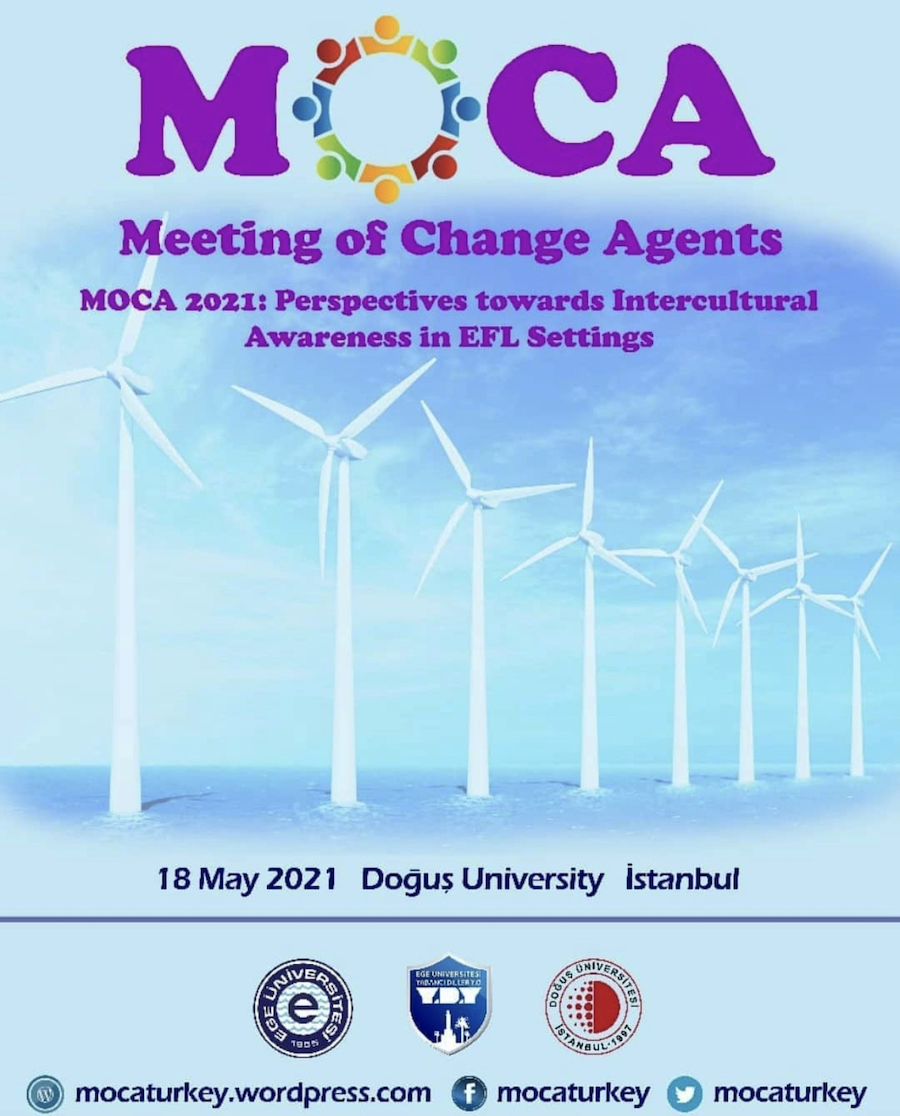Perspectives Towards Intercultural Awareness in EFL Settings
MOCA 2021
“Perspectives Towards Intercultural Awareness in EFL Settings”
Doğuş University May 18, 2021
Review
by
Celile Gürsu
 Initiated by Ege University in 2017, MOCA is a one-day annual event in which the teachers and students of the English Prep Class in Turkey get together, discuss ideas, and share experiences and teaching practices on different aspects of second language learning and teaching. This year the event was hosted virtually by Doğuş University on May18. There were 54 participants from 27 institutions and Sabancı University School of Languages was represented by Celile Gürsu and student representative Buse Merter.
Initiated by Ege University in 2017, MOCA is a one-day annual event in which the teachers and students of the English Prep Class in Turkey get together, discuss ideas, and share experiences and teaching practices on different aspects of second language learning and teaching. This year the event was hosted virtually by Doğuş University on May18. There were 54 participants from 27 institutions and Sabancı University School of Languages was represented by Celile Gürsu and student representative Buse Merter.
Theme
The focus of this year’s conference was on intercultural communication competence in language classes and what skills teachers and learners can develop to communicate better in intercultural settings. The event started with the hosting institution’s initial remarks on the global use of English and how such globalization of English has created a shift from following the ideal English speaker norms in language teaching to promoting the understanding and acceptance of other cultures and therefore raising intercultural awareness in language classes.
During the event, both teachers and learners collaborated to discuss the concept of intercultural awareness in EFL settings, and shared experiences and suggestions regarding the issue. Discussions were framed around the following questions.
1.How do you define intercultural communicative competence?
Here are some definitions given by both teachers and learners.
•Being able to communicate with people of other cultures.
•Understanding one’s own and other cultures, and consciously using the knowledge/awareness when establishing communication in multicultural contexts.
•Respecting each other.
•Showing empathy towards other cultures.
•Meta communication.
•Being open to other cultures and respecting their values while developing ‘a multicultural identity’.
2.To what extent are your courses designed to help learners become intercultural communicators?
Below are some of the activities, tasks, projects and course components that are mentioned by the participants to promote intercultural awareness in classes.
•Learning Advisory Programs (LAP), where native and non-native advisors support learners to improve their language skills and strategies.
•Extracurricular activities such as Public Speaking Clubs, Tea Talks, Ted Talks, Workshops, and Language and Culture Exchange Projects.
•Activities to improve pronunciation and accent.
•Digital friendship with learners from other countries (Tandem Learning).
•Collaborative projects with students from different countries to promote critical thinking skills and cultural empathy.
•Using materials (books, videos, articles, films) which touch upon cultural aspects to raise awareness.
•Student Mobility; opportunities for students to study abroad for a particular period.
3.How should intercultural communicative competence be integrated into the language curriculum? Challenges, solutions?
Some of the suggestions and solutions were as follow;
•Student-centered language and culture exchange events can be organized.
•Collaborative classes with other universities abroad can be arranged.
•Since raising awareness on intercultural communication is a multidimensional issue, it is essential to motivate students to learn more about the culture of the language.
•Financial support is also important for language schools to carry out cultural events and projects effectively.
•An interdisciplinary approach in language curriculum design should be considered.
•Course books should include cultural aspects of the language and should be designed in a way that encourages learners to think critically.
•The teachers’ role in promoting cultural awareness is important; teachers need to possess enough cultural awareness to be able to promote it among students.
Challenges
•Financial concerns.
•Resistance to learning a new language/culture.
•An exam-oriented education system.
•Prejudice against other cultures.
•Fear of being alienated from one’s own culture.
4.What would be the benefits of such curriculum/classroom practices/etc.?
Some of the benefits mentioned can be summarized as follows;
•They give learners the opportunity to discover new cultures.
•Learning about other cultures reinforces learners' commitment to their country's culture and strengthens learners' own identity.
•Learners become more open-minded and receptive to differences or ‘otherness’.
•Applying a curriculum which is designed to promote intercultural awareness provides learners with a tolerant and multicultural learning atmosphere.
•They also help learners appreciate racial and ethnic varieties and see people as a whole.
•They help learners with building multicultural identities.
Reflections
MOCA 2021 was a rewarding experience since the event provided me with a wider perspective to see what we as Sabancı University School of Languages do to promote intercultural communicative competence in our setting. I can say that our philosophy, vision, and mission statements are all in line with what was discussed and suggested in focus groups. During the discussions, both teachers and learners put forward some ideas and practices that they think might be necessary to improve students’ understanding of the target culture in a way that also improves students’ language learning. Among those ideas, I think the most important one is to create an institutional culture where different beliefs and values are appreciated and all cultural differences are avoided. This kind of inclusive approach motivates learners to develop a sense of respect for other cultures, and thus facilitates language learning. Sabancı University School of Languages’ anti-discrimination policy is a very good example of this. We also have different course components to support our learners’ intellectual growth and expand their knowledge of the world. Through courses such as CTSS, PBL CL, EMS, and task groups and projects such as the Language and Culture Exchange Project, the Queering ELT Task Group , and the Public Speaking Club, not only do we teach the necessary language skills, but also prepare our students for real-life situations, develop their critical thinking skills, give them experiential learning opportunities, raise their awareness about different cultures ,and encourage them to use bias-free language.
Overall, MOCA 2021 provided an insightful discussion on how to improve intercultural communicative competence and citizenship in EFL settings. Hearing learners’ voices also helped us refresh our perspectives as teachers and develop a better understanding of our learners’ needs and expectations regarding the issue.

